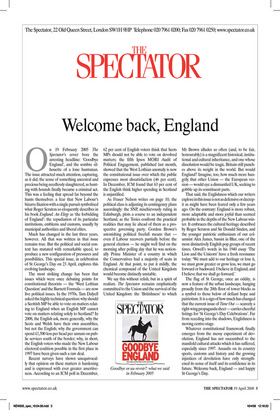Welcome back, England
On 19 February 2005 The Spectator’s cover bore the arresting headline: ‘Goodbye England’, and the sombre silhouette of a lone huntsman. The issue attracted much attention, capturing, as it did, the sense of something ancestral and precious being needlessly slaughtered, as hunting with hounds finally became a criminal act. This was a feeling that spread far beyond the hunts themselves: a fear that New Labour’s bizarre fixation with a single pursuit symbolised what Roger Scruton so eloquently describes in his book England: An Elegy as ‘the forbidding of England’: the repudiation of its particular institutions, emblems and customs, usually by municipal authorities and liberal elites.
Much has changed in the last three years, however. All that was written in that issue remains true. But the political and social context has mutated with remarkable speed, to produce a new configuration of pressures and possibilities. This special issue, in celebration of St George’s Day on 23 April, explores this evolving landscape.
The most striking change has been that issues which were once debating points for constitutional theorists — the ‘West Lothian Question’ and the Barnett Formula — are now live political issues. In the 1970s, Tam Dalyell asked the highly technical question: why should a Scottish MP be able to vote on matters relating to England when an English MP cannot vote on matters relating solely to Scotland? In 2008, the English ask, more generally, why the Scots and Welsh have their own assemblies, but not the English; why the government can spend £1,500 less per head per annum on public services south of the border; why, in short, the English voters who made the New Labour electoral coalition possible in the first place in 1997 have been given such a raw deal.
Recent surveys have shown unequivocally that opinion on these matters is hardening and is expressed with ever greater assertiveness. According to an ICM poll in December, 62 per cent of English voters think that Scots MPs should not be able to vote on devolved matters; the fifth Ipsos MORI Audit of Political Engagement, published last month, showed that the West Lothian anomaly is now the constitutional issue over which the public expresses most dissatisfaction (46 per cent). In December, ICM found that 63 per cent of the English think higher spending in Scotland is unjustified.
As Fraser Nelson writes on page 10, the political class is adjusting its contingency plans accordingly: the SNP, mischievously ruling in Edinburgh, plots a course to an independent Scotland, as the Tories confront the practical realities that may lie ahead of them as a prospective governing party. Gordon Brown’s astonishing political freefall means that — even if Labour recovers partially before the general election — he might well find on the morning after polling day that he was notionally Prime Minister of a country in which the Conservatives had a majority of seats in England. At that point, to put it mildly, the chemical compound of the United Kingdom would become distinctly unstable.
We say this without relish, but in a spirit of realism. The Spectator remains emphatically committed to the Union and the survival of the United Kingdom: the ‘Britishness’ to which Mr Brown alludes so often (and, to be fair, honourably) is a magnificent historical, institutional and cultural inheritance, and one whose dissolution would be tragic. Britain still punches above its weight in the world. But would England? Imagine, too, how much more hungrily that other Union — the European version — would eye a dismantled UK, seeking to gobble up its constituent parts.
That said, the Englishness which our writers explore in this issue is not as defensive or decrepit as might have been feared only a few years ago. On the contrary: England is more robust, more adaptable and more joyful than seemed probable in the depths of the New Labour winter. It embraces the cultural heritage described by Roger Scruton and Sir Donald Sinden, and the younger patriotic enthusiasm of our columnist Alex James, bassist in Blur, one of the most distinctively English pop groups of recent times. Orwell’s words in his 1940 essay ‘The Lion and the Unicorn’ have a fresh resonance today: ‘We must add to our heritage or lose it, we must grow greater or grow less, we must go forward or backward. I believe in England, and I believe that we shall go forward.’ The flag of St George, once an oddity, is now a feature of the urban landscape, hanging proudly from the 20th floor of tower blocks as a symbol to those below of defiant hope and patriotism. It is a sign of how much has changed that the current issue of Time Out — scarcely a right-wing propaganda sheet — carries cheerful listings for ‘St George’s Day Celebrations’. Far from receding into the shadows, Englishness is moving centre-stage.
Whatever constitutional framework finally emerges from the messy experiment of devolution, England has not succumbed to the manifold cultural attacks which it has suffered, especially since 1997. Assaults on its country sports, customs and history and the growing injustices of devolution have only strengthened its sense of itself and its confidence in its future. Welcome back, England — and happy St George’s Day.


















































































 Previous page
Previous page